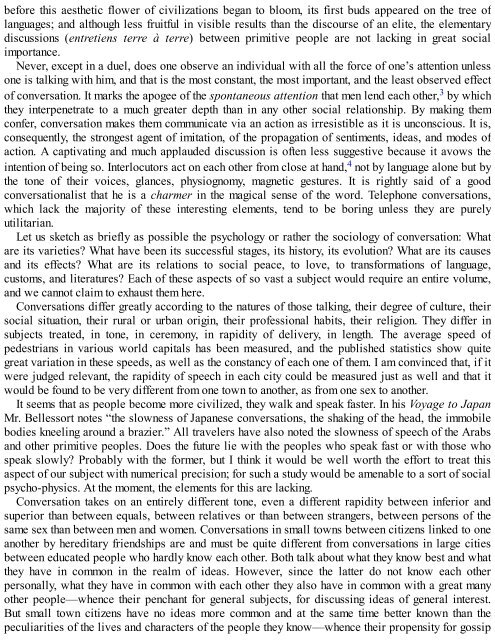3658925934
Create successful ePaper yourself
Turn your PDF publications into a flip-book with our unique Google optimized e-Paper software.
efore this aesthetic flower of civilizations began to bloom, its first buds appeared on the tree of<br />
languages; and although less fruitful in visible results than the discourse of an elite, the elementary<br />
discussions (entretiens terre à terre) between primitive people are not lacking in great social<br />
importance.<br />
Never, except in a duel, does one observe an individual with all the force of one’s attention unless<br />
one is talking with him, and that is the most constant, the most important, and the least observed effect<br />
of conversation. It marks the apogee of the spontaneous attention that men lend each other, 3 by which<br />
they interpenetrate to a much greater depth than in any other social relationship. By making them<br />
confer, conversation makes them communicate via an action as irresistible as it is unconscious. It is,<br />
consequently, the strongest agent of imitation, of the propagation of sentiments, ideas, and modes of<br />
action. A captivating and much applauded discussion is often less suggestive because it avows the<br />
intention of being so. Interlocutors act on each other from close at hand, 4 not by language alone but by<br />
the tone of their voices, glances, physiognomy, magnetic gestures. It is rightly said of a good<br />
conversationalist that he is a charmer in the magical sense of the word. Telephone conversations,<br />
which lack the majority of these interesting elements, tend to be boring unless they are purely<br />
utilitarian.<br />
Let us sketch as briefly as possible the psychology or rather the sociology of conversation: What<br />
are its varieties? What have been its successful stages, its history, its evolution? What are its causes<br />
and its effects? What are its relations to social peace, to love, to transformations of language,<br />
customs, and literatures? Each of these aspects of so vast a subject would require an entire volume,<br />
and we cannot claim to exhaust them here.<br />
Conversations differ greatly according to the natures of those talking, their degree of culture, their<br />
social situation, their rural or urban origin, their professional habits, their religion. They differ in<br />
subjects treated, in tone, in ceremony, in rapidity of delivery, in length. The average speed of<br />
pedestrians in various world capitals has been measured, and the published statistics show quite<br />
great variation in these speeds, as well as the constancy of each one of them. I am convinced that, if it<br />
were judged relevant, the rapidity of speech in each city could be measured just as well and that it<br />
would be found to be very different from one town to another, as from one sex to another.<br />
It seems that as people become more civilized, they walk and speak faster. In his Voyage to Japan<br />
Mr. Bellessort notes “the slowness of Japanese conversations, the shaking of the head, the immobile<br />
bodies kneeling around a brazier.” All travelers have also noted the slowness of speech of the Arabs<br />
and other primitive peoples. Does the future lie with the peoples who speak fast or with those who<br />
speak slowly? Probably with the former, but I think it would be well worth the effort to treat this<br />
aspect of our subject with numerical precision; for such a study would be amenable to a sort of social<br />
psycho-physics. At the moment, the elements for this are lacking.<br />
Conversation takes on an entirely different tone, even a different rapidity between inferior and<br />
superior than between equals, between relatives or than between strangers, between persons of the<br />
same sex than between men and women. Conversations in small towns between citizens linked to one<br />
another by hereditary friendships are and must be quite different from conversations in large cities<br />
between educated people who hardly know each other. Both talk about what they know best and what<br />
they have in common in the realm of ideas. However, since the latter do not know each other<br />
personally, what they have in common with each other they also have in common with a great many<br />
other people—whence their penchant for general subjects, for discussing ideas of general interest.<br />
But small town citizens have no ideas more common and at the same time better known than the<br />
peculiarities of the lives and characters of the people they know—whence their propensity for gossip









![Genki - An Integrated Course in Elementary Japanese II [Second Edition] (2011), WITH PDF BOOKMARKS!](https://img.yumpu.com/58322134/1/180x260/genki-an-integrated-course-in-elementary-japanese-ii-second-edition-2011-with-pdf-bookmarks.jpg?quality=85)
![Genki - An Integrated Course in Elementary Japanese I [Second Edition] (2011), WITH PDF BOOKMARKS!](https://img.yumpu.com/58322120/1/182x260/genki-an-integrated-course-in-elementary-japanese-i-second-edition-2011-with-pdf-bookmarks.jpg?quality=85)





